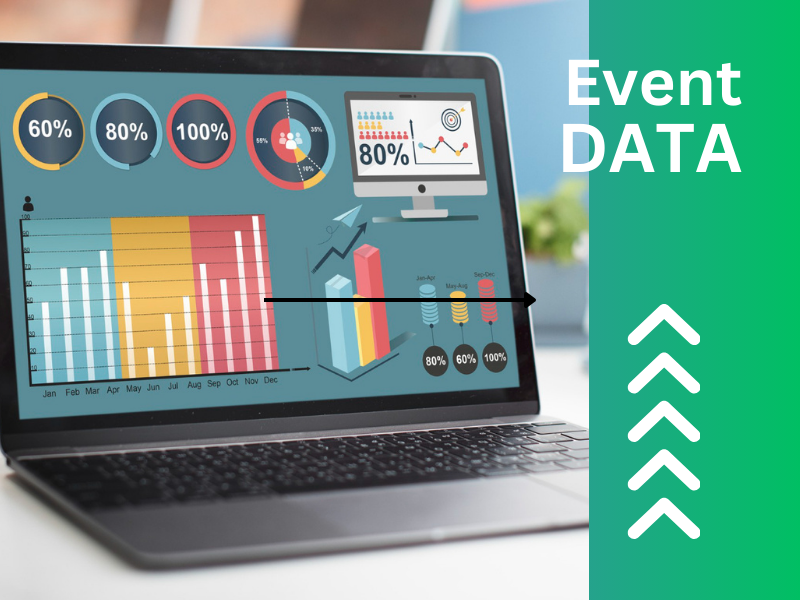Data analytics is transforming almost everything about human endeavours, even the way we consume food. Data is becoming like oxygen, the essential life wire of business, science, and technology. Everyone, including you, leaves footprints everywhere we go, especially online, and these are essential data.
The event industry is not in isolation, so it is positioned in such a manner now that it can’t function optimally without getting data analytics involved in its processes. It implies that any event professional who thinks they can do without data analytics will soon become extinct.
In this article, we shall examine profoundly why data analytics is becoming a crucial work tool for the event manager and what it is capable of achieving for the overall attainment of the event goals and its future.
Let’s begin by looking at what data analytics is for the event manager.
Table of Contents
What is data analytics for an event planner?
Data analysis in event management refers to the analytical process of reviewing already collected data (information) produced through event management procedures in order to get insights and identify trends for informed decisions. The method is built on a variety of strategies, including statistical analysis and machine learning patterns, to highlight important trends that could otherwise go overlooked.
Data-driven decision-making in planning events
Before now, event managers have perhaps depended on guesswork and have consequently always achieved inappropriate data, leading to un-informed decision-making as well as missing the target. However, rather than relying on speculation, experts can use accurate information to make decisions that will significantly affect how an event turns out.
This tactic enhances financial planning, increases the effectiveness of resource allocation, and customizes participants’ experiences during events. They also give the event planner the crucial capacity to alter their plans in real time, ensuring that events are flexible and adaptable to changing patterns.
Today, data-based judgments create a strong foundation for identifying important and significant events, indicating the end of the era of relying solely on intuition. In essence, the use of data-driven decisions enables event organizers to not only achieve but also exceed clients’ expectations by enhancing the overall experience at events and establishing an industry reputation for excellence.
How to apply data analytics and key components to note
Data analytics is like a compass for an event professional; it involves gathering and studying information from a variety of sources, which may include feedback forms, questionnaires, polls, surveys, social media interactions, and registrations from attendees.
When the information from these platforms is obtained and then analyzed, it is now very useful in providing valuable insights into attendee behaviour, preferences, and engagement patterns. The collected data can give the planner an idea of the sort of content, topics, themes, and logistics arrangements that will fit the audience. They can even be used to predict attendance, the timing of sessions, and even speaker preferences for subsequent events.
Key Component of Data Analytics in Event Management
The key components of this strategy in event management that must be noted are as follows: (a) gathering of the data or data collection; they serve as building blocks for the whole process. (b) Data processing: the process of arranging and structuring the data in relevant or common classes or variables (c) Data analysis: this is the actual process of using various techniques, such as statistical analysis and machine learning, to draw out meaningful information. (d) Data visualization includes the presentation of the data or information in a simple manner that will be understandable by users.
What can data analytics help event managers achieve?
Leveraging data analytics can, in many ways, impact success. According to 10times.com data analytics has created new horizons for event planners; it went further to express the following as what event managers may achieve with data analytics: (a) high-targeted and customized campaigns; event managers can use this to design personalized invites and personalized messaging for the attendees. (b) Increased engagement: Today’s generation places value on experience. Through data analytics, you can gain insights into what resonates with engagement, so you feed it to them.
In addition, (c) crowd shaping: according to this source, analyzed data can help control crowd flow and attendance by using RFID wristbands and Bluetooth tags to enhance the attendee experience.
Future trends in data analytics for event planners
The event industry depends on feedback, so imagine seeing a potential outcome before it happens. Event managers are equipped to design future events with analyzed data, discover the pain points, and potentially create a whole new experience for their attendees.
With this strategy, event organizers can plan, use resources wisely, and customize event components for maximum impact.
In conclusion, with the emergence of AI and machine learning fused into the world of data analytics, there is huge potential for the event industry. it is expected that creativity and innovation will be enhanced, and better-personalised event experiences will be created, not forgetting safety and security.












2 Comments
[…] insight obtained from analyzing historical data can help the event manager make informed decisions on dates and times suitable for an event; it can […]
[…] Data collection and analysis help provide very useful information about the attendees you are expecting at the event; it shows specific characteristics, behaviours, and interests. With this information, especially when effectively analyzed, event managers can create winning strategies for winning the attendees to their side. In addition, analysis of the collected data helps to simplify the process of deciding what messages to send, how and when to send them, and what the expectations of the attendees are. […]